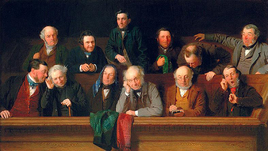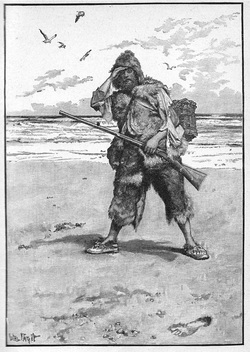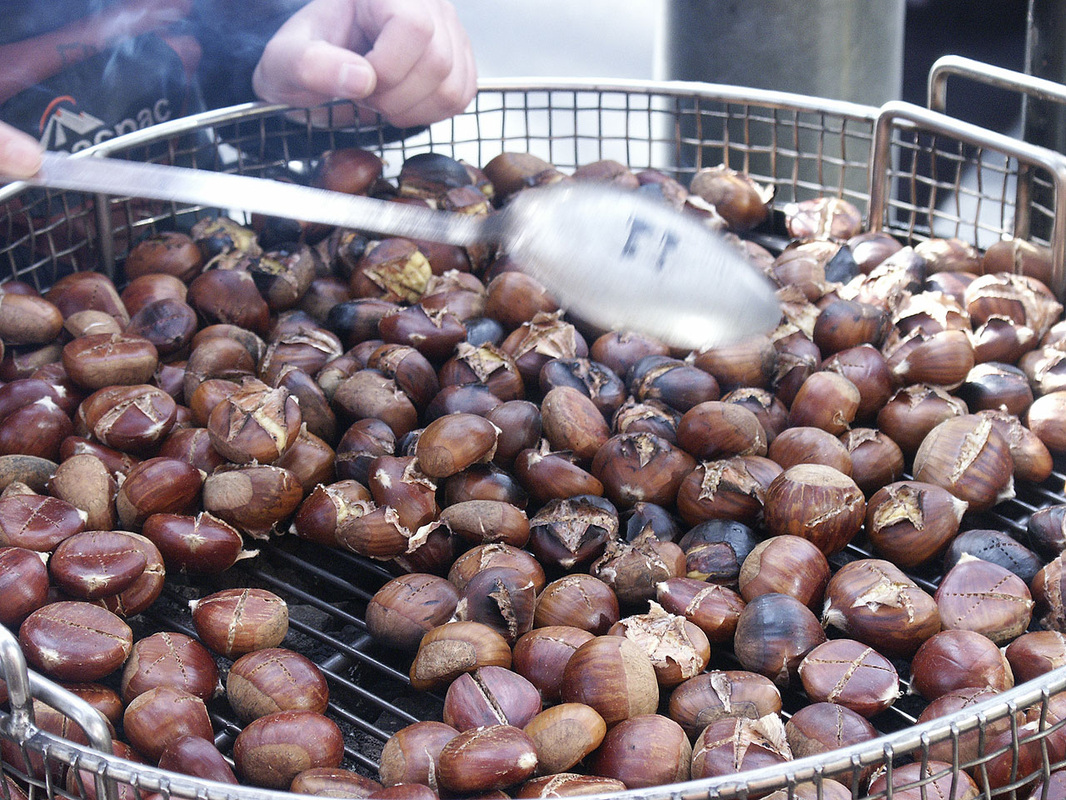\ˈju̇r-ər \
But I keep my mouth shut.
| I am sworn. That is the very nature of a juror: the word comes from the Anglo-Norman jurour from the Latin word iūrāre “to swear.” I have promised to hear all the evidence and to judge the facts, and well, I’ve got to live up to that. |
And like an airport or a hospital or a theme park, it’s a place that involves a lot of waiting, which gives me ample opportunity to watch the other creatures in the hive going about their business.
Attorneys, clients, and translators huddle in little knots, clutching file folders and conferring in English, or Spanish, or Vietnamese. Anxious women wrestle children in and out of strollers. Stray words float among the dust motes in the morning sun: arraignment, plea bargain, subpoena. Sleek-suited lawyers eel through the crowd, wheeling luggage carts overflowing with banker's boxes and binders and reams of printouts. A family gathers in a quiet corner and prays.
There are prisoners in County Jail jumpsuits and shackles being led to court appearances. Most look stoic, some resigned, a few are cheerful. The deputies keep others from getting too close, but every now and then a passer-by calls greetings or words of encouragement to a friend jingling past. Waiting for the elevator, a pair of young women, chained together, nudge each other and laugh at some whispered joke. I can’t quite see, but I think they are holding hands.
One morning a large crowd mills about in the corridor. Most are young men in the standard dudebro uniform of baggy shorts and polo shirts. “DUI Day,” a deputy tells me. By noon they are all gone.
A toothless old man in flip flops walks out of a courtroom, beaming. His daughter trails behind, deep in conversation with a translator and a lawyer: this piece of paper is a dismissal of charges, they tell her, show it to the clerk and they’ll be able to process the application. “Green card! Ha! Yes!” the old man crows, clapping his hands. He bows his thanks to the attorney as his daughter tows him off toward the stairwell.
There’s a small army of custodial workers, who keep this dingy, battered building incongruously spotless. The floors gleam. The baseboards are dusted. The cramped and inconvenient bathrooms are immaculate, with plenty of toilet paper. I’ve never seen a trash can more than half full.
The jurors on my case are the usual varied bunch: there’s a business owner, a sales clerk, a couple of managers, a cable technician. A retired professor, a landscape architect, a personal trainer, a programmer, a new college grad, a zookeeper. And me. We are of different ages, classes, races. We have almost nothing in common beyond language and citizenship. Yet through the peculiar alchemy of the legal system we motley twelve have been transformed into a jury and charged with the responsibility of rendering a verdict--literally “to state or report the truth”—about the question before us.
We act out the required rituals. When called, we all file in under the bailiff’s watchful eye and take our assigned places. The evidence is presented in an orderly gavotte: swearing-in, initial evidence, cross examination, re-direct. We watch and listen, taking notes in our steno books with cheap ballpoints. Whenever we return from a break, someone has refilled the dented water pitcher set on the edge of the jury box.
As I’m writing this, we are waiting in the corridor for the attorneys to work through a wrangle of some kind. We have fallen into our usual break-time habits. The business owner is on the phone trying to coordinate a carpool for a Cub Scout event. The personal trainer is immersed in Things Fall Apart; the zookeeper is reading Suze Orman. The landscape architect and the programmer are swapping barbeque recipes. The cable tech has slipped downstairs for a smoke.
A few dozen prospective jurors are assembling for voir dire in a trial just getting underway in the courtroom next door. They look anxious and uncertain, and the bailiff herds them into line. We old hands view them with the tolerant condescension of long-haul backpackers encountering a busload of day-trippers.
In a few minutes we will be called back to our case. We will file back into the courtroom and reassume our assigned places and our prescribed roles. The pitcher will be full again. The gavotte will continue.
That's all I can tell you. I swear.


















 RSS Feed
RSS Feed